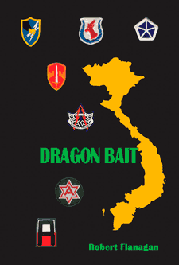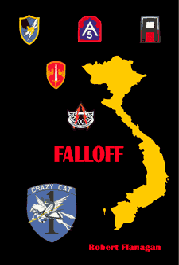ASA Trilogy by Robert Flanagan | Books in Review

Bob Flanagan served sixteen years in the Army Security Agency, which is the focus of his ASA Trilogy from Connemarra Press and AuthorHouse: Involuntary Tour (324 pp., $31.99, hardcover; $22.99, paper, 2009), Dragon Bait (336 pp., $28.95, hardcover; $19.95, paper, 2011), and Fall Off (392 pp., $31.99, hardcover; $23.95, paper).
Prior to his Army service, Flanagan had served in the Marines for seven years. “Though neither protagonist is Flanagan, the characters must, of necessity, embody much of his life, philosophy, experiences, and biases, ” his publisher says.
Flanagan began keeping a journal in Vietnam in the spring of 1964, he says, “with the intent of producing a novel.” He continued that practice until late fall of 1969. I believe that his novels benefit from that journal keeping because he has come up with pages packed with telling details of military life. Other readers might disagree, as they might find the thicket of military jargon daunting.

Robert Flanagan
Flanagan anticipated that potential problem and addresses it: “If there is one element for which I feel some explanation is due, it is the heavy use of slang, military jargon, acronyms, and other terminology more familiar to military and military veterans than to the general public, ” he writes. Flanagan says he wanted to portray “events and characters within a military world as truly as possible.”
He has done that. In fact, no one has done it better, not even James Jones in From Here to Eternity or his other masterworks. I was thrilled to read this trilogy, which is close to a thousand pages and deals with the life, loves, and military career of David Winter.
Flanagan presents us with three thick novels filled with memorable characters. Some we see off and on again throughout the entire length of the trilogy. Others we meet briefly and they are gone forever. I became so attached to the recurring characters, especially WO David Winter, that I was sad when I finished reading the third volume.
It took me a while to get into the rhythm of Flanagan’s writing. He is not writing for junior high school students—far from it. His writing is demanding, but rewarding. For instance: “The demand for bodies for that distant conflict was insatiable, swallowing them whole, ingesting, assimilating all into its bowels, converting into waste, vomiting out others in a partially consumed state, forever changed.” I’ve never read a better description of what the Vietnam War did to those of us it gobbled up.
 David Winter is described as not being “a war junkie, a militant groupie, ” and he wasn’t. But in the course of almost one thousand pages his part in the Vietnam War changes him in many painful ways—especially painful to those of us who have grown to love him. We root for him, and it is hard when he seems about to be crushed by the War Machine.
David Winter is described as not being “a war junkie, a militant groupie, ” and he wasn’t. But in the course of almost one thousand pages his part in the Vietnam War changes him in many painful ways—especially painful to those of us who have grown to love him. We root for him, and it is hard when he seems about to be crushed by the War Machine.
Winter is often on the edge of cataclysms that destroy others, but which spare him, or seem to. Winter’s dear friend Brenner at one point states his mantra: “There is no God but irony.” There is plenty of irony in these three novels. So if you are born deaf to irony, these books will be a challenge.
For those who don’t like to get your Vietnam War history by reading historical novels, I recommend that you read Unlikely Warriors: The Army Security Agency’s Secret War in Vietnam 1961-1973 by Lonnie M. Long and Gary Blackburn. That book offers an organized history of the ASA.
Flanagan’s books are not chronological and sometimes seem to be written to deconstruct any possible logical view of the military. Also, Flanagan offers episodes of apparently supernatural events, or at least magical realism, in which the reader butts up against people who cannot be explained scientifically. I enjoyed those occurrences, but I can see where some might be hornswoggled or nonplussed by them.
Flanagan does a better job than most in showing what he calls “the barricaded worlds” of Tan Son Nhut and Bien Hoa, Can Tho, Nha Trang, Plei Ku and other U.S. military installations in Vietnam. I spent a lot of time in three of those barricaded worlds, and attest to the truth of what he writes about life in those special military worlds.
 Flanagan also does a brilliant job evoking the world of the sneakers and peepers of ASA, whose endemic motto was, “In God we trust; all others we monitor.” The world of military monitoring is nowhere more fully explored than in this trilogy. Probably the thing Flanagan does best is to show the effect on his main character of “what it would be like to suddenly know all you had believed in was a shopworn joke.”
Flanagan also does a brilliant job evoking the world of the sneakers and peepers of ASA, whose endemic motto was, “In God we trust; all others we monitor.” The world of military monitoring is nowhere more fully explored than in this trilogy. Probably the thing Flanagan does best is to show the effect on his main character of “what it would be like to suddenly know all you had believed in was a shopworn joke.”
We get references to John Wayne, Indian Country, My Lai, Terry and the Pirates, Operation Ranch Hand and Agent Orange, Graham Greene, Sergeant Rock, Hemingway, Robert Ruark, and Isak Dinesen. Because I spent thirteen months in Vietnam working for the Inspector General, I especially enjoyed the rant about the “persnickety ways” of the I.G. Funny stuff. Yes, we were a chicken-shit outfit; I don’t deny it. We reveled in it.
I loved these three books, “the whole phantasmagorical magilla, ” to steal a phrase from Flanagan. If you loved Joseph Heller’s Catch-22 and John Ashmead’s The Mountain and the Feather , Flanagan’s books are for you.
If you want a challenge, if you want to immerse yourself in this military world, read these books. You will be rewarded beyond measure.
—David Willson

